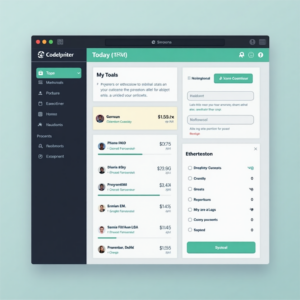
Introduction to CodeIgniter CRM Development
CodeIgniter is a powerful PHP framework used for building dynamic web applications, and it can be effectively utilized for developing a Customer Relationship Management (CRM) system. A CRM system helps businesses manage their interactions with customers, prospects, and partners, enabling them to streamline their sales, marketing, and customer service processes.In this article, we will delve into the world of CodeIgniter CRM development, exploring its benefits, features, and the process of building a CRM system using this popular PHP framework.
Benefits of Using CodeIgniter for CRM Development
CodeIgniter offers numerous benefits that make it an ideal choice for CRM development, including its lightweight and flexible architecture, easy-to-use interface, and robust security features. With CodeIgniter, developers can build a CRM system that is tailored to meet the specific needs of their business, allowing them to enhance customer relationships and improve overall business performance.Some of the key benefits of using CodeIgniter for CRM development include:
Fast and efficient development: CodeIgniter’s simple and intuitive interface enables developers to build a CRM system quickly and efficiently.
Highly customizable: CodeIgniter allows developers to customize the CRM system to meet the specific needs of their business, making it an ideal choice for companies with unique requirements.
Robust security: CodeIgniter provides robust security features, including encryption and secure data storage, to protect sensitive customer data.

Key Features of a CodeIgniter CRM System
A CodeIgniter CRM system typically includes a range of features that enable businesses to manage their customer interactions, sales, marketing, and customer service processes. Some of the key features of a CodeIgniter CRM system include:Contact management: The ability to store and manage customer contact information, including names, email addresses, phone numbers, and physical addresses.
Lead management: The ability to capture, track, and manage leads, including lead sources, lead statuses, and lead assignments.
Opportunity management: The ability to manage sales opportunities, including opportunity stages, opportunity amounts, and opportunity probabilities.
Task management: The ability to create, assign, and manage tasks, including task due dates, task priorities, and task assignments.
Process of Building a CodeIgniter CRM System
Building a CodeIgniter CRM system involves several steps, including planning, design, development, testing, and deployment. Here is an overview of the process:Planning: The first step in building a CodeIgniter CRM system is to plan the project, including defining the project scope, identifying the target audience, and determining the required features and functionality.
Design: The next step is to design the CRM system, including creating wireframes, designing the user interface, and developing a prototype.
Development: The development phase involves building the CRM system using CodeIgniter, including writing the code, integrating third-party libraries and APIs, and testing the system.
Testing: The testing phase involves testing the CRM system to ensure that it is working as expected, including testing the user interface, functionality, and performance.
Deployment: The final step is to deploy the CRM system, including setting up the production environment, configuring the system, and training end-users.
Conclusion
In conclusion, CodeIgniter is a powerful PHP framework that can be effectively used for building a Customer Relationship Management (CRM) system. With its lightweight and flexible architecture, easy-to-use interface, and robust security features, CodeIgniter enables developers to build a CRM system that is tailored to meet the specific needs of their business.By following the process outlined in this article, businesses can build a CodeIgniter CRM system that enhances customer relationships, improves sales and marketing performance, and increases overall business efficiency.